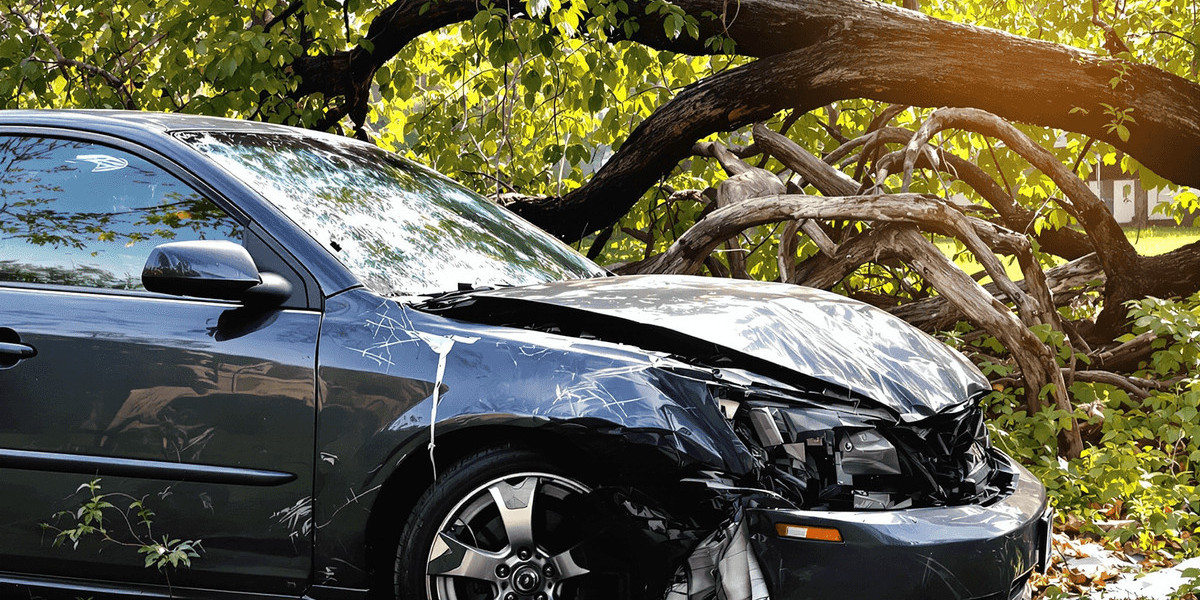? Don’t Pay for the Damage—Claim What You Deserve!
Introduction
Imagine this: You come home to find a fallen tree has crushed your garage, or your parked car shows signs of a hit-and-run incident. These situations emphasize why it's important for every property owner to understand property damage claims.
Property damage claims are a legal way to seek compensation when someone else's actions or negligence cause damage to your property. These claims can happen in various situations:
Car accidents
Natural disasters
Vandalism
Construction accidents
Negligent maintenance
Insurance is a key part of these claims, providing financial support. However, dealing with the complexities of property damage claims often requires more than just filing an insurance report. Knowing your rights, gathering the right documents, and understanding when to get legal help can make a big difference in getting fair compensation or having your claim denied.
This guide will cover:
The main types of property damage cases
The process of filing a claim step by step
The evidence needed for successful claims
Important things to consider about insurance
When to work with legal professionals
At Legal Assist, we've seen many property owners struggle with the claims process, often missing important deadlines or accepting low settlements. Whether you're dealing with minor damage or major loss, this comprehensive guide will give you the knowledge you need to protect your property rights and get the compensation you deserve.
Types of Property Damage Cases
Property damage claims encompass various scenarios that can affect personal and commercial properties. Let's explore the most common types:
1. Car Accidents
Vehicle damage claims arise from numerous situations:
Rear-end collisions: These accidents often result in significant damage to both vehicles, affecting bumpers, trunks, and internal components
Hit-and-run incidents: When unidentified drivers cause damage and flee the scene, leaving victims to navigate complex insurance claims
Parking lot accidents: From minor scratches to major dents caused by careless drivers or shopping carts
Multi-vehicle collisions: Complex cases involving multiple parties and insurance companies
2. Negligence
Property damage through negligence occurs when someone's failure to act responsibly leads to:
Fallen trees: Untrimmed or diseased trees that collapse onto neighboring properties
Structural failures: Buildings or walls that collapse due to poor maintenance
Water damage: Burst pipes or flooding caused by negligent upkeep
Construction accidents: Damage from nearby building work or renovations
3. Vandalism
Intentional property damage requires specific approaches for compensation:
Graffiti and defacement: Unauthorized artwork or markings on buildings and structures
Broken windows: Smashed glass from rocks, BB guns, or other projectiles
Vehicle tampering: Keyed cars, slashed tires, or broken mirrors
Property destruction: Damaged mailboxes, fences, or landscaping
Each type of damage requires specific documentation and evidence to support your claim. Insurance policies often cover different aspects of these damages, while some cases might need legal intervention for proper compensation.
For vandalism cases, immediate steps include:
Filing a police report
Documenting damage with photos
Securing the property from further damage
Contacting your insurance provider
Obtaining repair estimates from qualified professionals
The Process of Filing a Property Damage Claim
Filing a property damage claim requires careful attention to timing and procedural requirements. Each state enforces strict statutes of limitations - legal deadlines that determine how long you have to file your claim. These deadlines typically range from 1-6 years, depending on your location and the type of damage involved.
Critical Timeframes to Remember:
Insurance claims: 24-48 hours after incident
Police reports: Immediate to 72 hours
Legal claims: 1-6 years (state-dependent)
Property damage documentation: Within 24 hours
Identifying Liable Parties
Complex property damage cases often involve multiple responsible parties. A thorough investigation helps establish:
Primary liability holders
Contributing factors
Third-party involvement
Insurance coverage applicability
Example: In a multi-vehicle accident, liability might be shared between:
The driver who initiated the collision
A vehicle manufacturer for faulty brakes
A government entity for poor road maintenance
Choosing Where to File
The jurisdiction for your property damage claim depends on several factors:
Location of the incident
Residence of involved parties
Amount of damages claimed
Type of property damage
Small claims court handles disputes up to $5,000-$10,000, depending on state laws. Larger claims require filing in civil court, where different rules and procedures apply.
Filing Requirements
A complete property damage claim includes:
Detailed incident description
Photographic evidence
Repair estimates
Witness statements
Insurance documentation
Police reports (if applicable)
The proper venue selection impacts:
Case processing time
Available legal remedies
Court costs
Jurisdictional authority
Evidence Required for Successful Property Damage Claims
Building a strong property damage claim requires comprehensive evidence collection and meticulous documentation. Here's what you need to prove your case:
1. Visual Documentation
High-quality photographs showing damage from multiple angles
Video footage of the incident (if available)
Time-stamped pictures documenting the progression of damage
2. Professional Assessments
Written repair estimates from licensed contractors
Expert evaluations of structural damage
Independent appraisals of damaged items
Cost breakdowns for replacement materials
3. Witness Support
Written statements from eyewitnesses
Neighbor testimonies about pre-existing property conditions
Security camera footage from nearby properties
Expert witness reports for complex cases
4. Official Documentation
Police reports detailing incident circumstances
Insurance adjuster evaluations
Building inspection records
5. Financial Records
Original purchase receipts for damaged items
Maintenance and repair history
Previous property assessments
Proof of property value before damage
6. Communication Records
Correspondence with insurance companies
Emails or letters related to the incident
Phone call logs with relevant parties
Text messages documenting immediate aftermath
A police report serves as a crucial piece of evidence, particularly in cases involving criminal activity or accidents. These reports provide:
Official documentation of the incident
Contact information for involved parties
Preliminary damage assessments
Potential cause determination
Successful claims often hinge on creating a detailed timeline of events. Document each step:
Initial damage discovery
First contact with insurance companies
Professional inspections
Repair attempts
Communication with involved parties
Keep all evidence organized in digital and physical formats, maintaining copies in multiple secure locations. This systematic approach strengthens your position during negotiations and potential legal proceedings.
The Role Of Insurance In Property Damage Claims And When To Seek Legal Assistance
Insurance is crucial for property damage claims, acting as the primary protection against financial losses. Before taking legal action against someone else, it's important to carefully examine your insurance policy.
Understanding Your Coverage
Make sure you're aware of the following aspects of your insurance coverage:
Primary coverage limits
Deductible amounts
Specific exclusions
Additional riders or endorsements
Your insurance policy might have benefits that you don't know about. Many policies cover temporary housing costs while repairs are being done or provide replacement value instead of depreciated value for damaged items.
Navigating Multiple Insurance Policies
Property damage often involves multiple insurance policies. For example, if a tree falls from your neighbor's yard onto your house, it could activate both:
Your homeowner's insurance
Your neighbor's liability coverage
Any additional umbrella policies
When Insurance Falls Short
In cases of extensive damage, insurance coverage limits may not be enough. Common situations include:
High-value property losses that exceed policy limits
Disputed fault between parties
Denied claims due to policy exclusions
Multiple affected parties competing for limited coverage
The Insurance Claim Process
Follow these steps to navigate the insurance claim process effectively:
Document all damage thoroughly
Contact your insurance provider immediately
Review coverage details with your agent
Consider third-party claims if applicable
Evaluate settlement offers carefully
Complex Insurance Scenarios
Certain situations require careful navigation of multiple insurance policies:
Rental property damage involving landlord and tenant policies
Business property losses that include both commercial and personal coverage
Vehicle-related property damage involving auto and property insurance
A denied claim doesn't automatically mean the end of your case. Sometimes, insurance companies change their decisions when presented with new evidence or legal pressure. By understanding your rights and options under both your policy and relevant laws, you can make informed choices about whether to pursue legal action.
When To Seek Legal Assistance For Your Property Damage Claim
Property damage claims can quickly become complex, requiring professional legal guidance. Here are key situations that signal it's time for a legal consult:
1. Substantial Damages
Claims exceeding insurance policy limits
Multiple damaged properties or assets
Long-term impact on property value
2. Disputed Liability
Conflicting witness statements
Multiple potentially responsible parties
Unclear circumstances surrounding the incident
3. Insurance Company Challenges
Denied claims
Lowball settlement offers
Delayed responses or claim processing
A skilled property damage attorney brings essential expertise to your case. They can:
Gather crucial evidence through:
Expert witness testimony, possibly leveraging insights from fields like forensic psychology
Professional property assessments
Forensic investigations
Handle complex negotiations with:
Insurance adjusters
Opposition attorneys
Multiple stakeholders
Legal Assist specializes in navigating intricate property damage cases. Our attorneys work with qualified experts to establish:
True extent of property damages
Current and future repair costs
Hidden structural issues
Long-term value impact
In cases involving defective products, our team investigates:
Manufacturing defects
Design flaws
Safety standard violations
Product liability chains
We manage the technical aspects of your claim while you focus on property restoration. Our attorneys coordinate with:
Insurance companies
Construction specialists
Property assessors
Building code officials
This comprehensive approach ensures your rights are protected throughout the claims process, maximizing your chances of receiving fair compensation for your property damage.
In instances where your case escalates to a trial or other court proceedings, understanding the issues related to trials and having a proficient legal team can significantly influence the outcome of your claim.
Conclusion
Property damage claims can create significant financial strain and emotional distress in your life. The path to fair compensation requires careful attention to documentation, understanding insurance policies, and knowing when to seek professional legal guidance.
Key takeaways from this guide:
Document all damage thoroughly with photos and written records
File claims promptly within required deadlines
Understand your insurance coverage limits
Gather strong evidence to support your case
Recognize when legal expertise becomes necessary
The impact of property damage extends beyond visible destruction - it can disrupt your daily routines, create unexpected expenses, and cause lasting stress. Don't face these challenges alone. Legal Assist's experienced team stands ready to help you navigate complex property damage claims and secure the compensation you deserve.
Visit our website to access additional resources, schedule a consultation, or learn more about protecting your property rights through effective legal representation.
FAQs (Frequently Asked Questions)
What are property damage claims and why are they significant?
Property damage claims are requests for compensation due to damage inflicted on one's property, whether from accidents, negligence, or vandalism. They are significant as they help victims recover financially from losses incurred and ensure that responsible parties are held accountable.
What types of property damage cases can I file a claim for?
Common types of property damage cases include car accidents, negligence (such as falling trees or collapsed structures), and vandalism (like graffiti or broken windows). Each type has specific considerations and processes for filing claims.
What is the process for filing a property damage claim?
Filing a property damage claim involves several steps: adhering to statutes of limitations, gathering evidence to support your claim, identifying liable parties, and choosing the appropriate venue based on jurisdictional requirements.
What kind of evidence do I need to support my property damage claim?
To support your claim, you will need various types of evidence including photographs of the damage, repair estimates from contractors, witness statements, and possibly police reports if applicable. Thorough documentation is crucial throughout the process.
How does insurance impact my property damage claim?
Insurance plays a critical role in property damage claims. Before pursuing legal action against another party, it's essential to check their liability insurance coverage. Understanding how your own insurance interacts with third-party claims can also affect your decision on whether to file a lawsuit.
When should I seek legal assistance for my property damage claim?
You should consider seeking legal assislegal assist t if your case involves significant damages exceeding insurance limits, unclear fault due to conflicting evidence, or if you face challenges negotiating with insurers. Legal experts can help strengthen your case and navigate complex claims.








